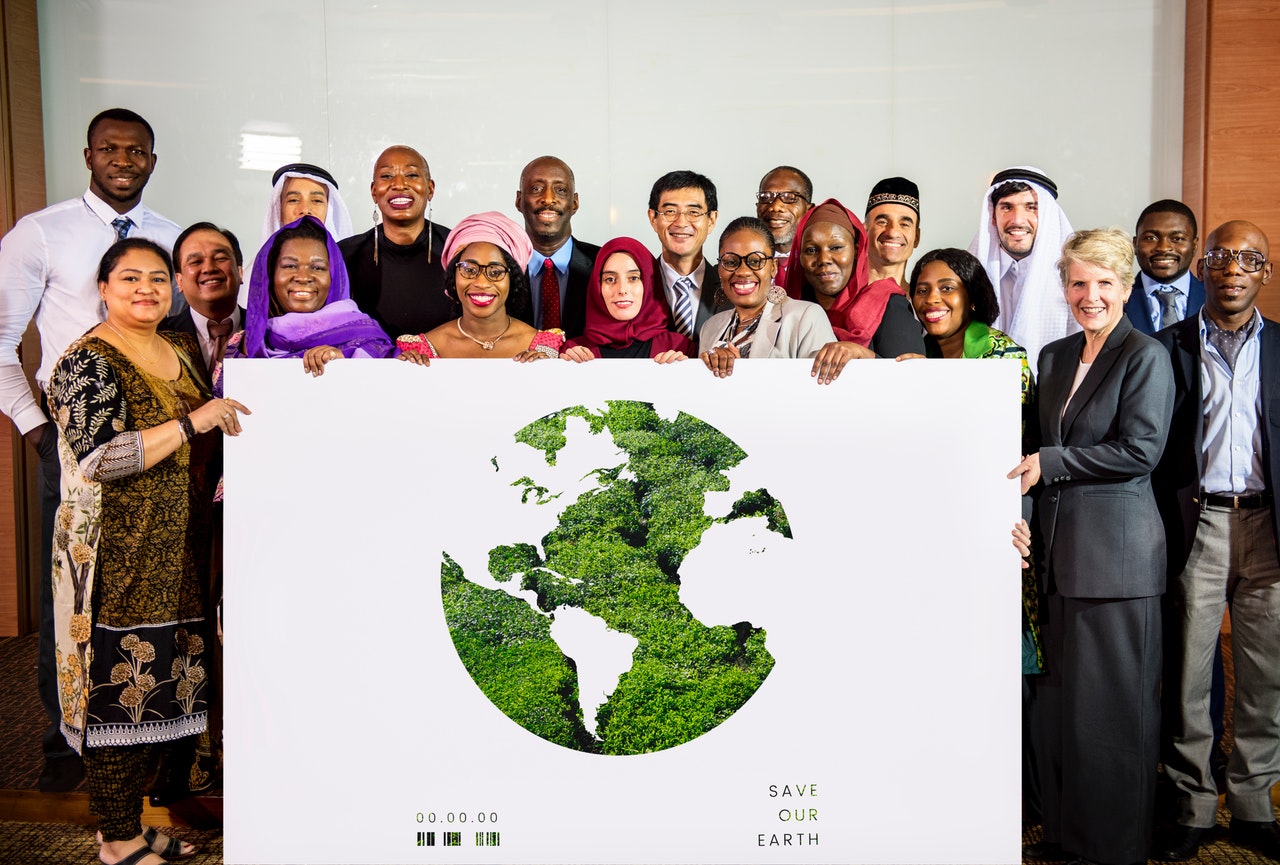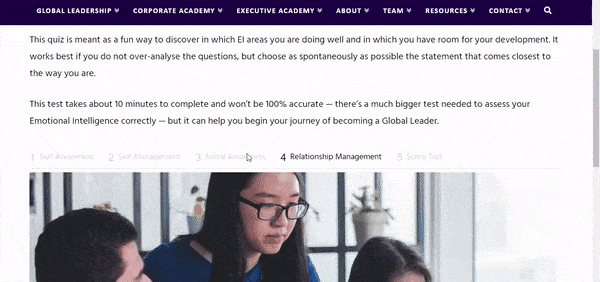Global leadership. Never have two words concealed so much depth. At surface level, it appears to be just another version of the management practices we may already be familiar with. In reality, it requires a whole set of competencies that global leaders must become proficient in to succeed in an increasingly demanding environment.
The multicultural competencies of global leaders naturally feature as crucial skills that help make the job of global leadership easier. Those competencies are:
- Cultural Sensitivity
- Cultural Intelligence
- Mindful Intercultural Communication
Let’s look at each in turn.
Cultural Sensitivity
Cultural sensitivity is an extremely high-level skill that must be intentionally developed by global leaders. First, let’s define what it is.
What is Cultural Sensitivity?
Cultural sensitivity in its most basic form is the ability to understand that there are differences in people’s cultures, and those differences will impact the way they do things both inside and outside of the working environment. The basic premise is simply accepting that people do things differently.
At this stage, it’s important to note that we are not necessarily talking about organizational culture, which refers to chosen value systems that help to form a code of conduct for employees. In this instance, we refer instead to the individual cultures of employees and the role that these different value systems play in each unique interpretation of the overall organizational culture.
In an increasingly interconnected world, it is a requirement that every person in the organization is culturally sensitive. It helps the individual teams to thrive in their diversity. You could argue that the level of understanding outlined above, is enough for the majority of people within an organization.
For global leaders, however, they need to go far beyond this definition and go instead on a journey that mentally frees them from the idea of cultural hierarchy; the belief that one culture should take precedence over another. This level of thinking opens up higher levels of understanding that will help global leaders become more accomplished and more effective.
Milton Bennett (1993) in his Developmental Model of Cultural Sensitivity, stated that for true cultural sensitivity to be reached, a person must move from an ethnocentric attitude to an ethnorelative attitude.

Ethnocentric Attitude
An ethnocentric attitude according to Bennett has three main stages of development.
Denial > Defense > Minimisation
Denial
The first is denial. Leaders of organizations don’t see the value of learning about the individual cultures of their workforce or the countries the company is operating in. Their belief is that company values should be interpreted in a way that reflects the cultural background of the company founders. The attitude at this point is to ignore that it should even be a feature of discussion.
In today’s world, in a lot of global companies, this attitude is being rejected and phased out. Whilst it would be nice if this was entirely altruistic, the truth is that in order to stay competitive and indeed grow the customer base, companies need to adapt to the changing environment. Customer tastes are now in a place where if they are offended by an ethnocentric attitude on the part of a company, they will boycott products and services to make a point.
A perfect example of this was displayed by Dolce and Gabbana in 2018, when they offended the whole of their Chinese customer base with a poorly thought-out advertising campaign. Chinese consumers are said to make up around 32% of D&G’s customer base; it seems like madness to alienate a third of your customers. Nevertheless, in the advert, a Chinese woman appeared to struggle whilst eating pizza with chopsticks. The woman appears in a western-style dress as she does this; the point was that viewers see this as funny.
The intention of this ad remains unclear, but Chinese consumers interpreted the message to mean that the Chinese woman embraced European fashion, but was not educated enough to really grasp the culture. She, and in turn Chinese people, were made to look and feel stupid. The brand issued an insincere apology that was not well received. It ended up having serious ramifications for the business; some analysts predicted that the total cost to the brand could be up to $500 million. All of this could have been avoided if Dolce and Gabbana had taken the time to get over their internal bias, or at the very least, hire an ad campaign team that was well versed in the nuances of Chinese culture. It was a costly and damaging mistake.
Defense
After this stage, an ethnocentric attitude will move to a more defensive line. Differences are recognized, but they are believed not to add anything positive. So a particular culture asserts itself as better than other cultures, creating a cultural hierarchy. A form of progress, but not much better than denial.
This way of thinking produces organizational strategy that is inherently very aggressive. It divides and it conquers and is almost colonial in its approach. Many of the world’s former empires were built in this way. Whole cultures were lost and destroyed in the process.
Again, this way of thinking is widely considered to be an unacceptable model for any organization that wishes to consider itself modern and forward thinking.
Minimization
The final stage takes on a more passive aggressive tone, whereby organizations use company culture as a smokescreen to reinforce their own cultural values. At this stage, organizations are aware of cultural difference but choose to focus solely on the human characteristics that unite people.
At first glance, this doesn’t seem so bad. Seeing people as people shouldn’t be a bad thing. But when it erases people’s culture and still holds up one culture as superior, for true global leaders, such an attitude can never be good.
You see this in action in today’s business world. Catastrophe Management Systems, for example, were caught up in a lawsuit in 2018 when Chastity Jones had a job offer rescinded after refusing to cut off her dreadlocks. Management at the firm cited that ‘dreadlocks can be messy’ and so refused to give her the job unless she cut off her hair.
In other words, they were happy to recruit a woman of color but it had to be on their terms, and in line with cultural values that one version of what ‘looks professional’ is better than another version. How an employee chooses to wear their hair should not impact the quality of work they produce. Their lack of cultural sensitivity cost them an experienced employee.
Ethnorelative Attitude
You can see that an ethnocentric view of cultural sensitivity does not appear to be fitting for global leaders. It’s outdated, and whilst it is a far easier approach, and an approach that many organizations use today, global leaders need to be up for taking on a greater challenge.
That challenge comes in the form of having an ethnorelative attitude. Let’s look at what that is. Again, Bennett outlines three stages:
Acceptance > Adaptation > Integration
Acceptance
Acceptance here is not a glum, moody attitude towards difference. It’s actually the starting point global leaders will go through to become competent in shifting perspectives. At this point it is understood that ‘ordinary’ means different things to different people. It may be ordinary in one country for people to show up and work 9am to 5pm. It may also be ordinary for people to show up at 7am, work until midday, and then have a 3‑hour lunch break. Then they come back and work from 3 until 6pm. It’s still eight hours of work, there’s just a different application.
The pursuit of finding out the inner workings of the different cultures that feed into the workforce is intentional. It becomes an important part of strategy, which is clearly absent from the ethnocentric view.
Increasingly as teams become more remote, this will become a necessary attitude for global leaders to embed in their way of approaching management tasks.

Adaptation
Adaptation takes acceptance a step further as global leaders start to actually engage in communication that is tailored to the different cultures present. It’s similar to learning a language; you start off being able to read it a little and maybe understand key phrases. Then the next stage is to start being able to actively speak and communicate in that language. It may feel a little clunky and a bit alien but nonetheless, you give it your best shot.
Global leaders who are developing this skill may feel like this as they learn to switch between different perspectives. You start to know instinctively how to approach and deal with the different cultural contexts, and you do so without judgment.
Integration
At this point, the full expression of what it means to be culturally sensitive is realized. Having gone through the stages of acquiring the knowledge of all the different cultural contexts relevant to their management tasks, a person now moves seamlessly through all these contexts, instinctively accounting for them and responding to them as a native would.
We see examples of this in people who can speak more than one language. Global leaders should actively aim for this level of cultural sensitivity. To become fluent in understanding, adapting to and integrating different cultures will hugely increase the effectiveness of a global leader, giving them invaluable versatility and maturity that will have a hugely positive impact.
So why spend so much time talking about cultural sensitivity being a competency for global leaders to master?
The simple answer to that is that the ability to be culturally sensitive underpins all the other multicultural competencies. Global leaders must be able to move seamlessly through the different cultural frames in order to master the other competencies. It’s the only foundation that will adequately sustain global leaders in their roles and must be understood fully.
Cultural Intelligence
The next building block for culturally sensitive global leaders, is cultural intelligence. All of us at some point would have heard of emotional intelligence. Emotional intelligence is about being able to accurately assess and manage emotions. It’s a fundamental skill within a workplace environment. Without it, it’s very difficult to understand and motivate a workforce, or unite them behind a common goal.
Someone who has a high level of emotional intelligence is understanding, empathetic and able to manage their own emotions. Interpersonal relationships are strong because the ability to correctly identify the emotions of others actively guides their thinking and behavior in order to achieve mutually beneficial goals.
Cultural intelligence can be considered to be the next level up from emotional intelligence. It includes both the ability to correctly identify when a person is operating out of universal human idiosyncrasies and when a person is acting out of cultural conditioning. Once this distinction is made, a culturally intelligent leader is able to accurately modify their behavior accordingly to ensure they get the best out of the people they interact with.
Domestic managers can be emotionally intelligent and that will be enough to discharge their duties at a high level. Global leaders however, in keeping with the complexity in which they operate, must do more than be emotionally in tune. They must also endeavor to be culturally in tune and flow between the two competencies. In short, global leaders are like chameleons; they morph and they change in order to do business with people that operate outside the native culture of the leader or the organization.
Mindful Intercultural Communication
Once the hard work of becoming culturally sensitive and intelligent is done, the next stage is to become competent at mindful intercultural communication. The groundwork has already been laid at this point so all that remains for a global leader to do is to understand what intercultural communication is.

What is Intercultural Communication?
Intercultural communication is the practice of being able to clearly communicate with people from different cultures. It’s important because cultural identity is developed socially through various mediums of communication. Global leaders have to understand the dynamics of how a culture is formed in this way and then tailor their communication style in a way that honors these cultural and social norms.
In the same way emotions impact the way human beings internalize messages, so does culture impact us; it affects the way we encode messages. In order for global leaders to become proficient in this competency, the way they communicate must be:
- Appropriate
- Adaptive
Appropriate Intercultural Communication
Some cultures are happy to communicate over the phone or via email. Other cultures require that people are physically present when discussing things of significance. Global leaders must be able to ascertain what is appropriate for the given audience.
Adaptive Intercultural Communication
The goal of any global leader when it comes to mindful intercultural communication should be to constantly be looking for ways to reduce the possibility of being misunderstood. When considering how a message should be delivered, global leaders are acutely aware of how a person’s culture affects how they interpret any message given. Competent leaders make sure that when they deliver a message, the goal is to be understood correctly and for that message to be encoded and interpreted as intended.
Both of these practices will help global leaders communicate effectively with other cultures, ensuring that messages are positively received, and common objectives can be met.
All of these competencies come together to form a highly effective skillset. Ultimately, those who are able to master these skills, set themselves apart as some of the most gifted leaders; inspiring leaders who are able to transcend the boundaries of culture to lead people in a common purpose.
If you want to know more about global leadership and how to become one of these gifted, inspiring leaders, sign up for our weekly newsletter now:


